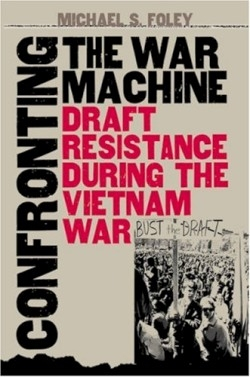Confronting the War Machine
Draft Resistance during the Vietnam War
Questions of fairness about the draft and of the legality and morality of the Vietnam War stimulated an active draft resistance movement in Boston from 1966-69. The movement provided alternative viewpoints and responses to the Johnson administration’s prediction that victory “is the light at the end of the tunnel.” The author, an historian at Staten Island College, presents an illuminating portrayal of the Boston movement and of the idealistic young men and women who sought to inspire an overwhelming public revolt against the war.
Foley provides a clear, perhaps too precise, distinction between draft resisters and draft dodgers. Resisters followed the strategies of Martin Luther King’s civil rights leadership, aiming to inspire a “beloved community” of races and economic classes who would form a mass movement opposed to the war. Draft dodgers were selfishly motivated to evade the draft by intentionally flunking the physical and mental tests required for induction, claiming to be homosexual, or leaving America for more sympathetic countries, usually Canada. Despite their different responses, resisters and dodgers were in agreement about the unconstitutionality of the war and were frequently sympathetic to each other’s decisions.
The trial of the Boston Five in 1968 was the most publicized and important event of the Boston resistance movement. Foley provides exciting coverage of this trial, which resulted in guilty verdicts for the defendants, who included the much-admired pediatrician Benjamin Spock and Yale University Chaplain William Sloane Coffin. The verdicts, however, were overturned the following year; Spock and Coffin were absolved of the charges of counseling resisters to evade the draft. Foley notes that Attorney General Ramsey Clark ran afoul of President Johnson because he had become sympathetic to draft resistance. In fact, Clark had hoped that the Boston Five Trial would serve as an effective public forum in which Spock and Coffin could articulate a credible antiwar response.
The Boston resistance movement fragmented in 1968 when Martin Luther King, its revered role model, was assassinated. By the following year this resistance movement was defunct. Although its immediate goal of ending the war was not realized-almost two million more American soldiers and Vietnamese were to die before the Americans withdrew in 1973-the resistance movement provided important links to the veterans’ antiwar and women’s movements that occupied the forefront of social protest during the 1970s. Foley has written an informed history of this lesser known but significant antiwar organization.
Reviewed by
Karl Helicher
Disclosure: This article is not an endorsement, but a review. The publisher of this book provided free copies of the book to have their book reviewed by a professional reviewer. No fee was paid by the publisher for this review. Foreword Reviews only recommends books that we love. Foreword Magazine, Inc. is disclosing this in accordance with the Federal Trade Commission’s 16 CFR, Part 255.

